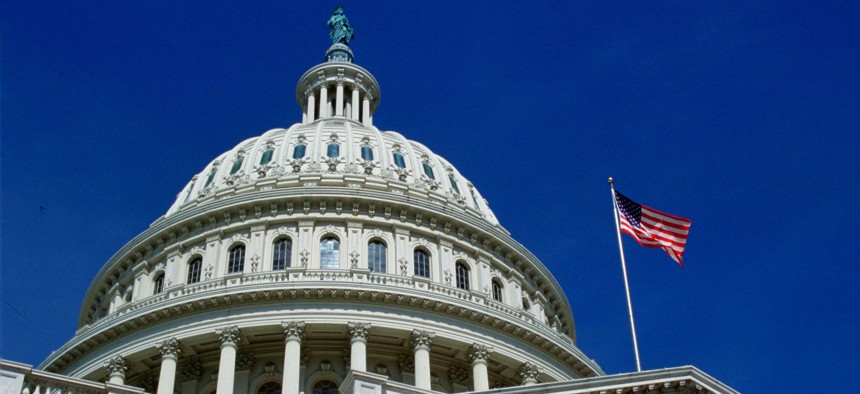
The Senate is still in the process of agreeing on top-line spending levels. Tim Graham / Getty Images
The House Is Ready to Start Voting on Fiscal 2023 Spending Bills, But the Senate Is Much Further Behind
The Senate, the ultimate clearinghouse for funding measures, is just starting the process of writing bills and has not yet agreed upon top-line spending levels.
The two chambers of Congress are moving forward with fiscal 2023 appropriations on diverging tracks, with the House readying final votes on its measures and the Senate just starting to write bills.
The House will vote next week on a package of six of the 12 annual spending bills Congress must pass each year. Lawmakers have approved all 12 of the bills necessary to avoid a shutdown at the committee level, though they did so with virtually no Republican support. The bills include nearly across-the-board spending increases and match many of the priorities outlined in President Biden’s fiscal 2023 budget, leading to a number of GOP objections.
The first package will include funding for the departments of Transportation, Housing and Urban Development, Agriculture, Energy, Treasury, Interior, Veterans Affairs and many other related agencies. House leaders have not yet indicated when they will vote on the remaining bills, but have said they would like to pass them before Congress recesses for the month of August.
“Democrats in Congress have been fighting to secure transformative federal investments that help fight inflation, lower the cost of living, create jobs and support working families,” said Rep. Rosa DeLauro, D-Conn., who chairs the House Appropriations Committee. “We are committed to combating climate change, bolstering mental health services, supporting our veterans, and building safer communities with less crime and violence and more security.”
The Senate, meanwhile, has yet to release or hold any markups on its bills. The House measures will ultimately have to go through significant revisions in the Senate to win over the bipartisan support required in that chamber. Jay Tilton, a spokesman for Sen. Patrick Leahy, D-Vt., who heads the Senate Appropriations Committee, said the chairman has been trying to first strike an agreement on a top-line funding level before drafting the bills. Democrats and Republicans remain sharply divided over the total figure and the breakdown for defense and non-defense spending. Negotiating an agreement on those numbers is “the most efficient path to completing fiscal 2023 bills,” Tilton said.
“But in the absence of a deal, the Appropriations Committee needs to do its work,” he said. “It has a responsibility to the American people.”
He added committee members are beginning to “put pen to paper” to write “fair, responsible bills” that the panel will release at the end of July. Leahy is currently absent from the Senate after receiving hip surgery, but Tilton said he is working closely with the subcommittee chairs and staff to complete the committee’s work.
Without an agreement on the top-line funding levels, it is unclear how close to a final product the Democratic bills will be. The subcommittee chairs can work with their Republican counterparts in drafting the legislation, but they will likely have to make edits in the coming months over policy riders and final spending totals.
A key sticking point in the talks is funding for the Pentagon, with Republicans pushing for parity between spending increases for domestic agencies and the Defense Department. The House and Senate have put forward their own versions of the annual defense authorization bill, with the upper chamber proposing an extra $44 billion.
Current funding is set to expire Oct. 1, leaving lawmakers little time after the August recess to strike a deal and vote. Congress could once again rely on stopgap funding bills to buy time and avoid a shutdown, but the midterm elections in November loom over the process.







